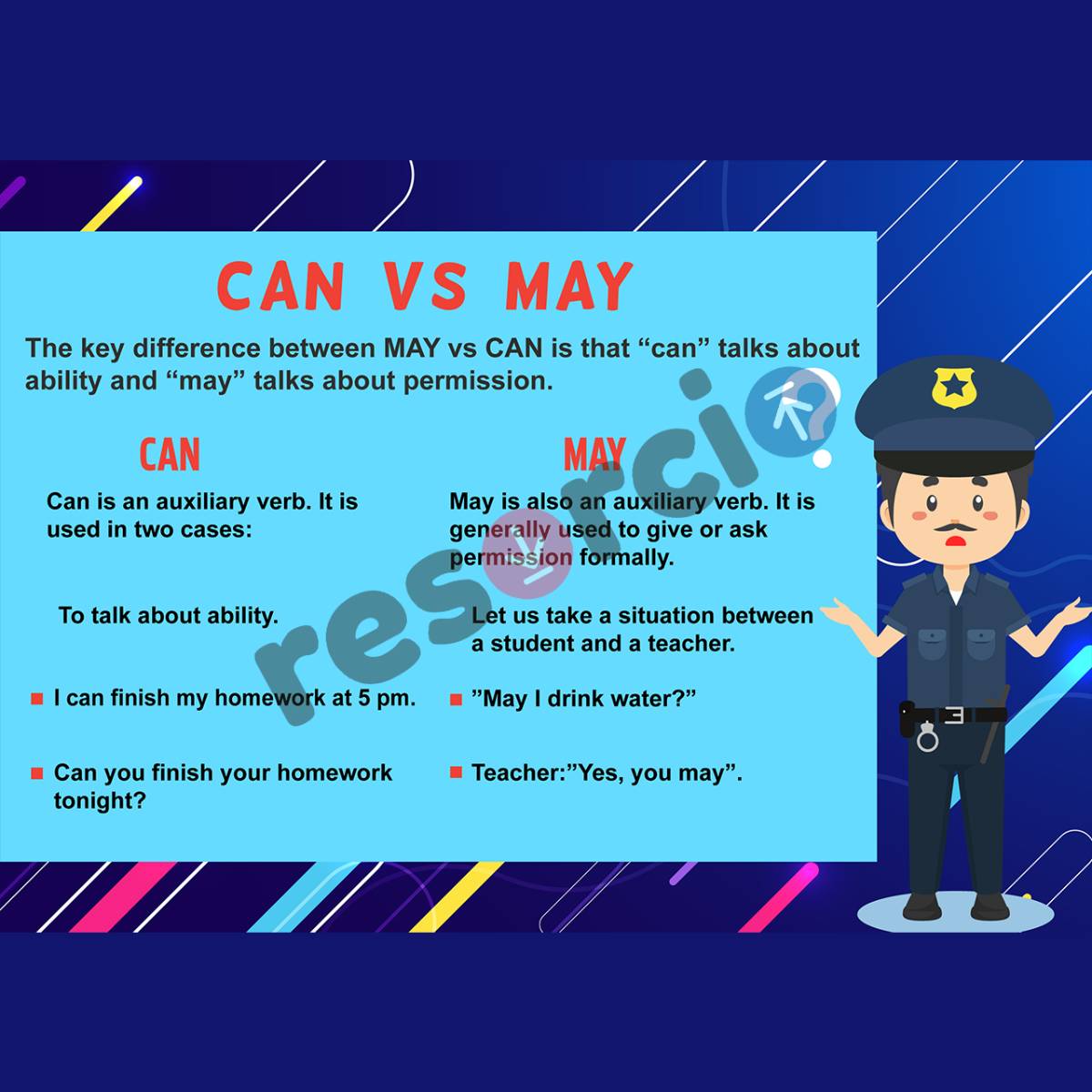Can Vs May 02

Can Vs May Pdf Verb Linguistic Morphology When using can, it denotes possibility or capability. for example, ‘i am not sure if i can lift the table myself.’. in this sentence, can indicates whether the person has the physical capability to do the task. on the other hand, may indicates permission. for example, ‘may i lift the table?’. "may, 2nd" is typically used in more formal writing, such as invitations or announcements, while "may 2" is more commonly used in everyday writing. this phrase is correct and commonly used in formal writing, such as invitations or announcements.

Can Vs May 02 What's the difference? can and may are both modal verbs that express permission or ability. however, there is a subtle difference between the two. "can" is used to indicate someone's ability or capability to do something, while "may" is used to ask for or grant permission. Synonym for can "can" and "may" are both modal verbs used to express permission or ability, but they have different nuances: 1. "can": example sentence for ability: "he can play the guitar very well." example sentence for permission: "can i borrow your pen, please?" 2. "may": example sentence for permission: "may i use your phone to make a quick call?" example sentence for possibility. Can implies that the person can do something, while may imply permission. can is used for expressing ability, possibility, or permission in informal situations, while may is used for formal or polite situations to ask for permission or make a request. Grammatically, it is considered completely acceptable to use can and may interchangeably in the context of permission. however, the word can is often seen as being less formal or polite than using the word may in this context. this distinction is most commonly applied to spoken english.

Can Vs May 03 Can implies that the person can do something, while may imply permission. can is used for expressing ability, possibility, or permission in informal situations, while may is used for formal or polite situations to ask for permission or make a request. Grammatically, it is considered completely acceptable to use can and may interchangeably in the context of permission. however, the word can is often seen as being less formal or polite than using the word may in this context. this distinction is most commonly applied to spoken english. "can" indicates ability or capacity, while "may" suggests permission or possibility. "can" denotes ability or possibility, while "may" indicates permission or likelihood. "can" and "may" are both modal verbs in english, but they serve different purposes. while "can" often implies a person's capability or potential to do something, "may" generally suggests permission or a possibility that something will happen. Although the use of the 'permission' sense of can is not regarded as incorrect in standard english, there is a clear difference in formality between the two verbs: may is, generally speaking, a more polite way of asking for something and is the better choice in more formal contexts. Understanding the differences between “may” and “can” is crucial for clear communication, yet these terms often confuse both learners and fluent speakers of english. while both words express possibility or permission, they have distinct roles and meanings.

Can Vs May 06 "can" indicates ability or capacity, while "may" suggests permission or possibility. "can" denotes ability or possibility, while "may" indicates permission or likelihood. "can" and "may" are both modal verbs in english, but they serve different purposes. while "can" often implies a person's capability or potential to do something, "may" generally suggests permission or a possibility that something will happen. Although the use of the 'permission' sense of can is not regarded as incorrect in standard english, there is a clear difference in formality between the two verbs: may is, generally speaking, a more polite way of asking for something and is the better choice in more formal contexts. Understanding the differences between “may” and “can” is crucial for clear communication, yet these terms often confuse both learners and fluent speakers of english. while both words express possibility or permission, they have distinct roles and meanings.

Can Vs May 01 Although the use of the 'permission' sense of can is not regarded as incorrect in standard english, there is a clear difference in formality between the two verbs: may is, generally speaking, a more polite way of asking for something and is the better choice in more formal contexts. Understanding the differences between “may” and “can” is crucial for clear communication, yet these terms often confuse both learners and fluent speakers of english. while both words express possibility or permission, they have distinct roles and meanings.

Can Vs May 05
Comments are closed.